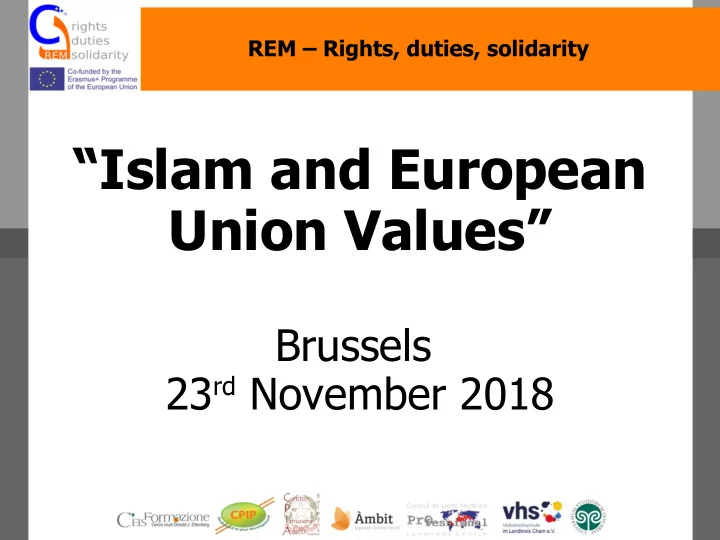

REM – Rights, duties, solidarity “Islam and European Union Values” Brussels 23 rd November 2018
REM – Rights, duties, solidarity Project Rem – Rights, duties, solidarity
THE OBJECTIVE OF THE PROJECT To promote democratic values, fundamental rights, intercultural understanding and active citizenship, and, in that way, to prevent violent radicalization that is strictly related to the issues of identity, culture and sense of belonging.
THE GOOD PRACTICE : DOZZA’S PRISON TRAINING COURSE Rem project take inspiration by a good practice: a training course organized in the Dozza’s prison in Bologna , a city in the north of Italy. This course, called “Rights, duties, solidarity”, involved prisoners , enrolled at the school in prison, coming from Muslim countries. Two editions of the course in Dozza prison in Bologna: one in school year 2014/15 and the other in school year 2015/16. The idea of the course is by Ignazio De Francesco, a monk of the Little Family of Annunziata, islamologist and volunteer in Dozza’s prison for relations with Arab / Muslim detainees, who coordinated the teaching activities.
THE PURPOSE OF DOZZA’S GP ● Reading and an illustration of some parts of the Italian Constitution and stimulation of the thought of the participants. ● Show the intimate connection between the rights and duties in building a civil society. ● Indicate in the constitutional principle of "solidarity" an ethical value well attested in the islamic sources and capable of overcoming the strictly accounting logic of an opportunistic observance of the rules.
THE METHOD To be based on the linguistic, religious and cultural heritage of the participants to the training . Encourage mutual knowledge to open up to dialogue , an essential condition for achieving the definition of a shared heritage of values, a fundamental objective of the project . Avoid censorship / circumvention of all possible points of difference : it mustn’t be a problem to highlight certain specifics of the Italian or European constitutional principles, in order to better understand in which country the migrant came and what principles he must accept, if he wants to live in an informed manner.
THE UPSCALING Rem project is upscaling the Dozza’s good practice on four levels: 1) New type of recipients: - inmates and former inmates that are not attending educational courses to learn language of the hosting country and for the acquisition of school diploma - migrants who attend language courses to obtain residency permit or school diploma - unaccompanied minors and asylum applicants hosted in residential facilities - females and not only males like in the Dozza’s training course
THE UPSCALING 2) New areas of services for migrants: - language schools and basic training for migrants - hosting communities linked to SPRAR system 3) Dissemination and adoption of the training modules at national level in each partner’s country 4) Creating a network of interested organization interested in the adoption of training modules at European level
THE STAFF TO CREATE THE TRAINING To create new training modules, inspired by Dozza’s gp is necessary expertise in three areas: language, law and islamic studies, so the experts involved in staff are: - language teacher/ tutor - islamologist/cultural mediator - law teacher
PILOT COURSE – FIRST ADAPTATION The first adaptation of the Dozza’s gp was made by CPIA (public center for adult education) in Bologna. The challenge was to adapt for first the training out of the prison with students male and females from different countries . The teachers who runned the course were both involved in the two editions of the Dozza’s training and knowed it very well. The students were part of a class that attended lesson at Cpia after having obtained a junior high school diploma. The 26 participants were from 16 different countries of the World. The training was composed by 8 lessons: 6 lasting 2 hours and 2 conducted as workshop of 3 hours each one.
PILOT COURSE – FIRST ADAPTATION Topics of the lessons: -rights and constitutions -men, women, family -equality and solidarity -right to mental and physical health -religion and power -two essential rights: education and work And a final workshop to create a final product as a elaborated version of the topics of the training by the students.
COURSES BY PARTNERS Cpia shared lesson plans of the pilot course with other partners that designed their training modules and tools, adapting newly the training to their different targets and their national contexts in Germany, Italy, Romania and Spain. Actually 180 persons, from a lot of different countries, are attending the courses. The targets are: - migrants students participating to the courses of language of the hosting country or courses to obtain a recidency permit - unaccompanied minors and young asylum applicants living in residential facilities for migrants - inmates and former inmates - school students from 14 to 17 years old
COURSES BY PARTNERS In all the targets are involved females and, as agreed by the partnership, during the second transnational meeting in Valencia, also persons from the partner’s country (and not only migrants) and not only persons of muslim faith can take part to the training. We presume that the most of the participants are muslims but we decided to avoid to ask the religious faith during the recruiting to not give the idea to stigmatize a religious faith. The presence of students with different faith could help also in the challenge of promote an intercultural dialogue.
Recommend
More recommend